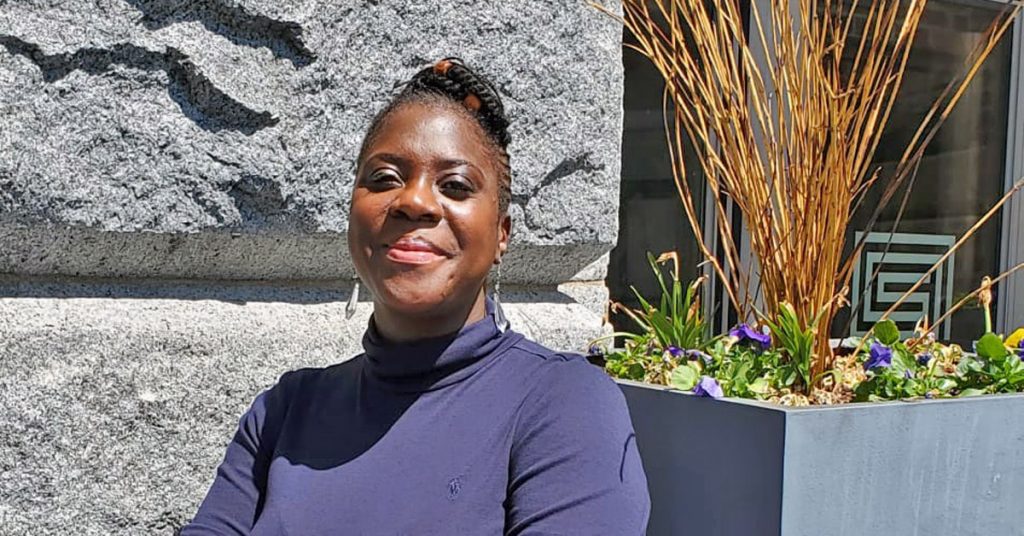Solidifying the foundation for equity
 Shaya Gregory Poku engages personal, institutional mission in new associate vice president role
Shaya Gregory Poku engages personal, institutional mission in new associate vice president role
Shaya Gregory Poku is Wheaton College’s inaugural associate vice president for institutional equity and belonging, charged with overseeing the new Office for Institutional Equity and Belonging that is focused on making empowerment of all central to how the college operates. We recently asked her questions about her new role and the work ahead. The conversation will be revealed in a three-part series. This is part one.
What led you to take on this challenging role?
“I took this position for several reasons. I took this position because I am hopeful. Hope is an underestimated component of liberation work. I believe that we can work together toward progress in key areas and anchor justice and empowerment in a way that is unmistakable. People are experiencing deep pain and frustration from oppression, and that bothers me. The issues are vast, and when we are not getting better in these areas, we are causing tremendous harm. All of my career steps have centered around the question of how can I transform violence, exploitation, apathy and oppression into access, restoration, engagement and liberation. Doing this is a vocation for me and the associate vice president role is very much aligned with the questions I am seeking to answer through my work.
“I took the position because I have been part of the Wheaton community since fall 2017, and I have seen countless ways the institution has prioritized its commitment to advancing this work. This is distinctive in higher education and it makes me proud.
“And, finally, I said yes to this position because I can do this work in continued partnership with many others on campus. I am building from a strong and intentional foundation working alongside offices like the Marshall Center for Intercultural Learning, the Center for Global Education, the Center for Social Justice and Community Impact, Center for Religious and Spiritual Life, and Accessibility Services, as well as cross-divisional initiatives like Diversity, Equity and Access Leadership (DEAL); the Network for LGBTQ+ Inclusion, Support and Advocacy; the First-Gen and Low-Income Task Force; and others. There is an infrastructure to ‘seed the ground’ with these campus resources and the college’s 2017 Diversity and Inclusion Strategic Plan. These all facilitate the conditions for us to be successful, and I believe we can have an impact. That is why I said yes.”
What do you think is the biggest challenge in doing this work?
“The biggest challenge is also the greatest opportunity—the scale and scope of the work. For some, the limiting nature of incremental progress will be utterly dissatisfactory, and for others, it will be overwhelming. We have to be candid about these limitations and tensions, but not let them be an excuse for us to not do everything possible to make sure our community truly serves and supports justice. This will be a long journey and I have to help the campus keep that in mind. The work did not begin with me and it will not end with me. As Coretta Scott King said: ‘Struggle is a never-ending process. Freedom is never really won; you earn it and win it in every generation.’”
Can you share your initial goals?
“Over the next three years, my goals for the Office of Institutional Equity and Belonging are to improve communication about equity and belonging efforts and our progress; investigate and learn from institutional gaps that are driving systems of injustice and inequality within the Wheaton community; and empower individuals with resources, training and the confidence to palpably improve the climate on campus.”
A year from now what are you hoping to have achieved?
“I hope that there will be more transparency so members of the wider Wheaton community are clear about the equity and belonging work that is being done, why it is being done and where it is intended to lead us. I want to have galvanized even more people to dig into the work and see the possibilities I seek to make Wheaton a national exemplar of inclusion.”
Your title is about equity and belonging. How do you view both?
“Belonging is confidence that the lives and experiences of historically marginalized people matter on this campus. Belonging is ensuring everyone can believe and trust that they are respected as a valued member of the community. Research clearly shows that when students feel that they belong, they perform better academically. Belonging is something that matters for faculty, administrators and staff, too. It is a human need. Belonging and equity are inextricably linked. Equity grounds us in acknowledging and addressing systemic inequities; while belonging calls us to build new ways of being in community with one another.”
